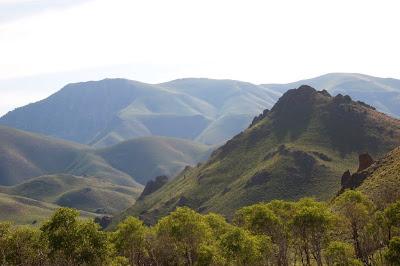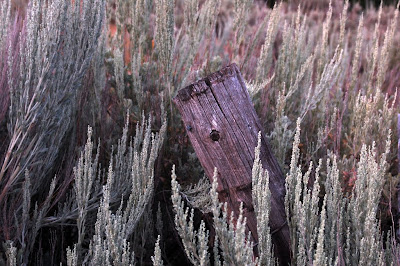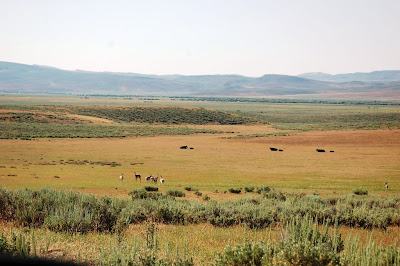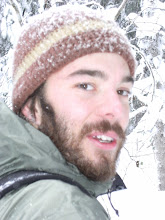 There are creeks there too small for our recognition, vernal flows, some buttoned with squat willows, others stringing green cuts through grassy valleys. Then, surprisingly, after an hour kicking up dust on sinuous roads of rock and gravel, you look at the map to find some trickle given a name, maybe Porcupine, Muldoon or Baugh, perennial streams that defy the summer heat, harbor flickering brook trout, or a flat of ragtag cottonwoods like brooding jungle in the scrubby sage defined hills. These are the feet of the Pioneer Mountains, a range most likely unheard of outside of Idaho. It's a spare landscape marked by sagebrush steppe, rising at times to smooth ridges or the opposite; outcropped slopes and cone shaped hills sprouting craggy heads of rock. Summer brings sheep and Peruvian herders, huddling in green and white covered wagons. Wolves are close. Winter brings a dry blast of cold sun. Wind.
There are creeks there too small for our recognition, vernal flows, some buttoned with squat willows, others stringing green cuts through grassy valleys. Then, surprisingly, after an hour kicking up dust on sinuous roads of rock and gravel, you look at the map to find some trickle given a name, maybe Porcupine, Muldoon or Baugh, perennial streams that defy the summer heat, harbor flickering brook trout, or a flat of ragtag cottonwoods like brooding jungle in the scrubby sage defined hills. These are the feet of the Pioneer Mountains, a range most likely unheard of outside of Idaho. It's a spare landscape marked by sagebrush steppe, rising at times to smooth ridges or the opposite; outcropped slopes and cone shaped hills sprouting craggy heads of rock. Summer brings sheep and Peruvian herders, huddling in green and white covered wagons. Wolves are close. Winter brings a dry blast of cold sun. Wind. I've lived on its edge this summer, but explored mostly its margins, turned around by rough roads, waterless draws that led on to higher, sparser peaks with only the company of frost on summer nights. One occasion which we pushed further, brought us searching for pronghorn antelope, looking through binoculars for collars , listening to the varying bleeps individual signals transmitted through a radio. Justin was our liaison into this world, working in tandem with the Wildlife Conservation Society to study the range and habit of pronghorn migration.
I've lived on its edge this summer, but explored mostly its margins, turned around by rough roads, waterless draws that led on to higher, sparser peaks with only the company of frost on summer nights. One occasion which we pushed further, brought us searching for pronghorn antelope, looking through binoculars for collars , listening to the varying bleeps individual signals transmitted through a radio. Justin was our liaison into this world, working in tandem with the Wildlife Conservation Society to study the range and habit of pronghorn migration.At the northern reach of our outing, adjacent the classic T shaped entrance to a ranch, we searched the high hills leading to the bold, naked slopes of the high pioneers. A few cattle scuttled at a safe distance from our vehicle when we noticed the rumble of a distant truck pushing over the cattle strewn fields in a shout of dust. When the small, beat Datsun came to a halt, a woman in a weathered denim button down and baseball hat stepped out like a cop. "Do I know you?" her eyes hidden behind shades. The air pricked tense and laughter that earlier had rang between the five of us sharing the truck seemed to retreat to Hailey. Justin introduced himself with an air of confidence while I reached that real divide between us in our hiking boots, working for a land trust and the sense of belonging bestowed on those who choose the sun and wind. Her name was Jenny.
 We told her we were looking for antelope and she just looked at us stupefied. "Really? Antelope? Is that the new thing?" she asked, chuckling as if we were city folk taking pictures of cows. Justin put his foot atop her front tire and leaned on his leg calm and devoted, explaining the radio collars and their purpose. "I couldn't care less about antelope," she said.
We told her we were looking for antelope and she just looked at us stupefied. "Really? Antelope? Is that the new thing?" she asked, chuckling as if we were city folk taking pictures of cows. Justin put his foot atop her front tire and leaned on his leg calm and devoted, explaining the radio collars and their purpose. "I couldn't care less about antelope," she said."Well then let's talk about something else," he tried with a determined, methodical approach to the conversation. And the confrontational tones did eventually smooth out like slack water. A friendly conversation found a renewed congeniality. Yet talk with Jenny was like navigating a boulder field. With her views on antelope secured, talk turned to wolves, we veered only to find Sun Valley's pomp lurking ahead. We all stared north to the mountains while we spoke as if conversation itself was held up by the muscular peaks. Eventually the talk, becoming dominated by Jenny, who found what must have seemed like a crowd at her doorstep, evaporated. We were to go about our business.
As our Dodge bumped and switchbacked up the stark hills I realized us outsiders were going home and the harrowing political environment surrounding reform in the ranching west now loomed like the next rugged hill. Any entrance to the relatively sparsely populated range-land feels like an intrusion. Everything seems far away. The notion of a bill in congress that would affect a far flung locale like the Pioneer foothills is a joke. It's no wonder western congressmen break out the cowboy boots and wrangler jeans when they come back to their constituents.
 As demonstrated by rancher's overwhelming political clout despite their low numbers, we tend to give in to their defenses, seeing something of that pioneer we dreamed about before the reality of a desk job. Perhaps we feel the need to honor their lifestyle for the difficulties it reveals. There may always be that doctrine in America that values hard work on the land over any and all else, despite the cost to the land itself, which conveniently was never given a voice.
As demonstrated by rancher's overwhelming political clout despite their low numbers, we tend to give in to their defenses, seeing something of that pioneer we dreamed about before the reality of a desk job. Perhaps we feel the need to honor their lifestyle for the difficulties it reveals. There may always be that doctrine in America that values hard work on the land over any and all else, despite the cost to the land itself, which conveniently was never given a voice. We saw a lot of antelope that day, including a younger female who struggled beneath a livestock fence. At one stop we startled some sage grouse, a species in decline all over the west. I can say I'd like grazing on public lands to end. But I say that snug in front of my computer, not swishing through the cheat grass while the sun steals off westward with its heat. I don't live in that precarious holdover called the range. I don't have an investment that requires a lot of land, whether or not it's mine or all of ours.
We saw a lot of antelope that day, including a younger female who struggled beneath a livestock fence. At one stop we startled some sage grouse, a species in decline all over the west. I can say I'd like grazing on public lands to end. But I say that snug in front of my computer, not swishing through the cheat grass while the sun steals off westward with its heat. I don't live in that precarious holdover called the range. I don't have an investment that requires a lot of land, whether or not it's mine or all of ours.
